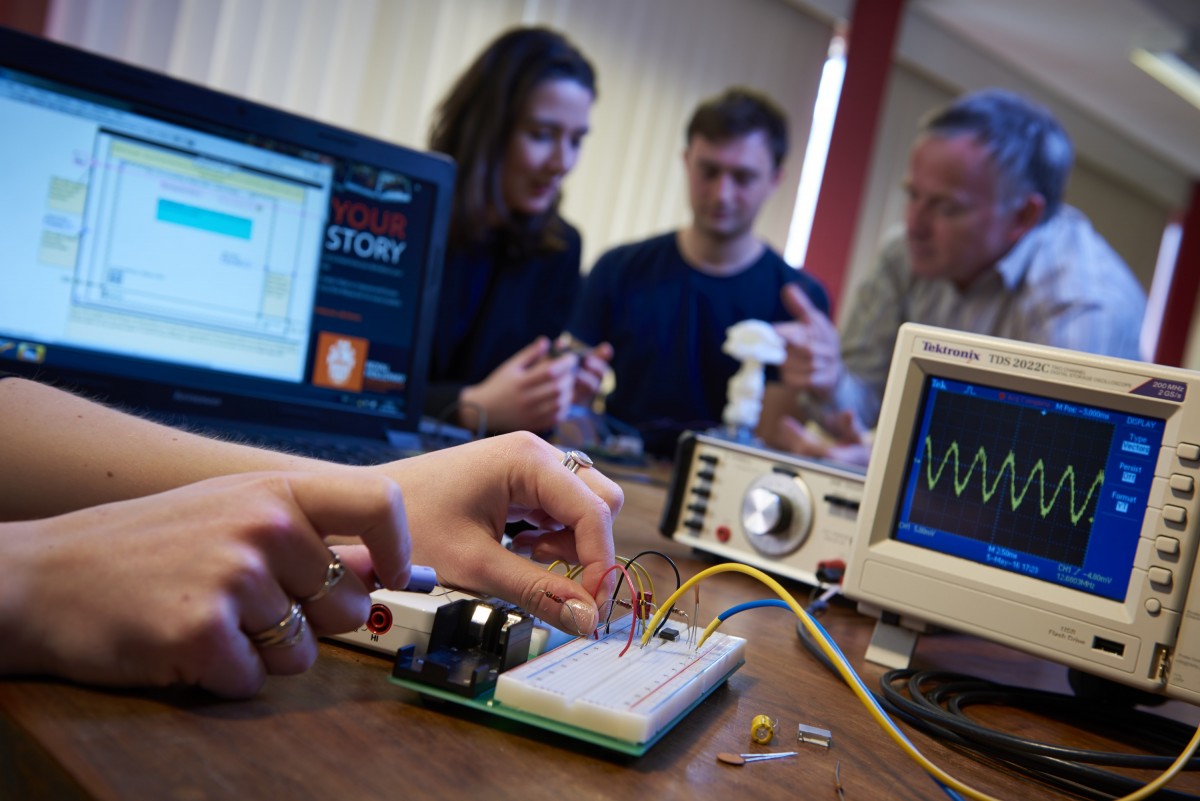“There is no generic engineer – studying an engineering subject will allow you to shape a career around your areas of interest…using the skills you love.” – James McNaughton, Engineering Graduate, Royal Holloway University of London
From aerospace to energy, automotive to IT, telecommunications to programming; Electronic Engineering is a cross-sectoral discipline that allows graduates to work in a diverse range of industries.
“Engineering is a popular and specialised industry,” comments Prospects UK. “As an electronic engineer, you could be working with high-level technology in a range of sectors.
“Electronic engineers design, develop and test components, devices, systems or equipment that use electricity as part of their source of power,” the profile continues. “These components include capacitors, diodes, resistors and transistors.”
And at the Royal Holloway University of London – a prestigious, top 30-ranked education provider in the heart of the UK capital – there’s never been a better time to delve into the Electronic Engineering field, with brand-new BEng and MEng degrees delivered in a cutting-edge £20 million building.
This innovative construction, home to the department’s new, industry-led degrees and ground-breaking research groups, has been purposely-built to incorporate up-to-date equipment and facilities, with ‘help yourself’ collaboration and research spaces, staff offices and project fabrication, plus computing and electronics laboratories. In-line with the department’s principle of promoting inherent creativity, even the roof will serve as a valuable field laboratory, fully-equipped with solar panels that allow students to investigate energy generation devices under various weather conditions.
“Our undergraduate degree programmes in Electronic Engineering can be studies as a three-year BEng…or four-year MEng…and if you want to include a year in industry, we can help you…find a placement that’s right for you,” the institution notes. “Whichever option you choose, you will learn the theoretical and practical knowledge for tomorrow’s electronics industries, acquiring valuable skills through hands-on, project-based activities to prepare you for an exciting career ahead.”
A stand-out feature of the Royal Holloway’s Electronic Engineering portfolio lies in its ability to maintain an equal gender balance, breaking down barriers in a discipline that’s traditionally perceived as male-dominated. Appealing to both men and women, Royal Holloway is breaking down stereotypes in the UK, Europe and the world, recruiting budding engineers solely based on their talents, regardless of age, background or sex.
In fact, the university has already received a Bronze Athena SWAN award in recognition of its inclusivity and equality. And with the new £20 million contemporary building, the institution hopes to attract and retain a far higher proportion of female engineering students than the current UK average.

Image courtesy of the Royal Holloway University of London
All degrees follow the same structure throughout the first three years. The principles of Electronic Engineering are comprehensively covered throughout years one and two, with module choice available in years three and four, giving students the chance to hone their skills in areas that interest them most. Embedded systems team projects in years one, two and four allow students to experience prototyping through a valuable three-way process. Built on the pillars of ingenuity and prototyping through to a final product, invaluable, practice-led opportunities such as these offer students a uniquely creative route into the sphere of Engineering.
“Our dynamic, fast-moving, technological world needs more graduates equipped with the right skills to be creative, [to] innovate and invent,” the Science Faculty notes.
“We have many links to regional and national industry and through our contacts we will ensure that our degree programmes are commercially-relevant and cover latest needs,” it adds, “create opportunities for our students to develop a strong set of employability skills, and lead to potential industrial year placements, vacation internships and employment after graduation.”
Detailed in design and innovative in focus, Electronic Engineering at Royal Holloway is rich in opportunity and endless in potential. Providing the perfect balance between theoretical and practical knowledge, courses cross the perimeters of Computer Science, Physics, Environmental Science, Music and Media Arts to present students a collaborative STEM-based education brought to life through creativity.
As an experienced, supportive department in a cutting-edge new building set in one of the world’s most dynamic cities, Royal Holloway’s Engineering graduates gain a world-class education in a regional electronics hub. Here, students will learn to master the skills they’ll need to thrive in a world of fast-evolving technologies that can seem ruthless to the uninitiated.
“Electronic engineering is at the heart of many systems we use on a daily basis, including mobile communications, computers, transport systems…TV, radio, music studios and gaming devices,” the Faculty concludes.

Image courtesy of the Royal Holloway University of London
“Graduates in Electronic Engineering will have the skills to contribute to tomorrow’s systems that support everyday life.”
Follow Royal Holloway University London on Facebook, Twitter, YouTube, Instagram and LinkedIn
Liked this? Then you’ll love these…
5 UK Engineering departments providing unparalleled practical experience
4 US providers of Petroleum Engineering education that open doors to career success










